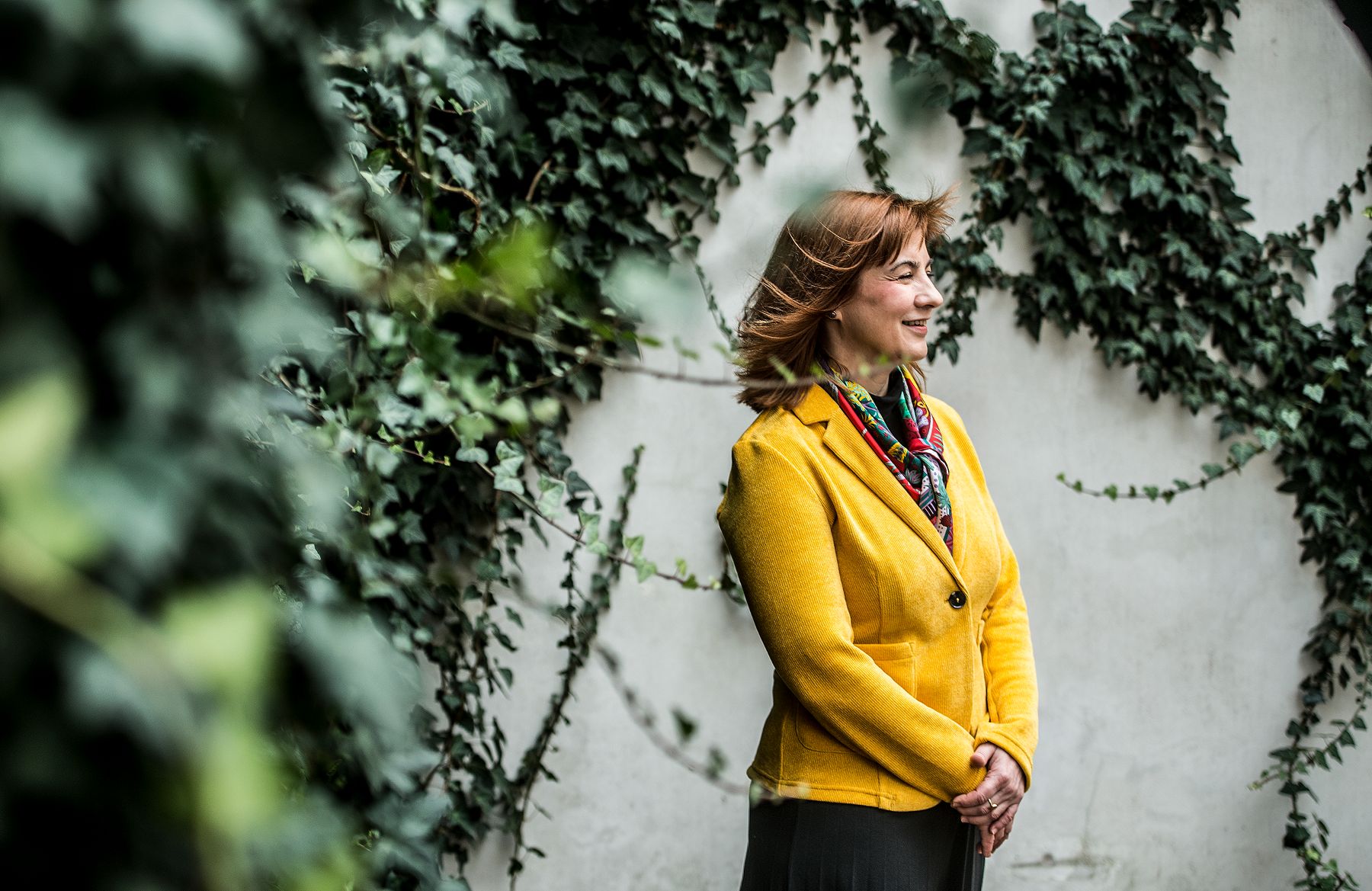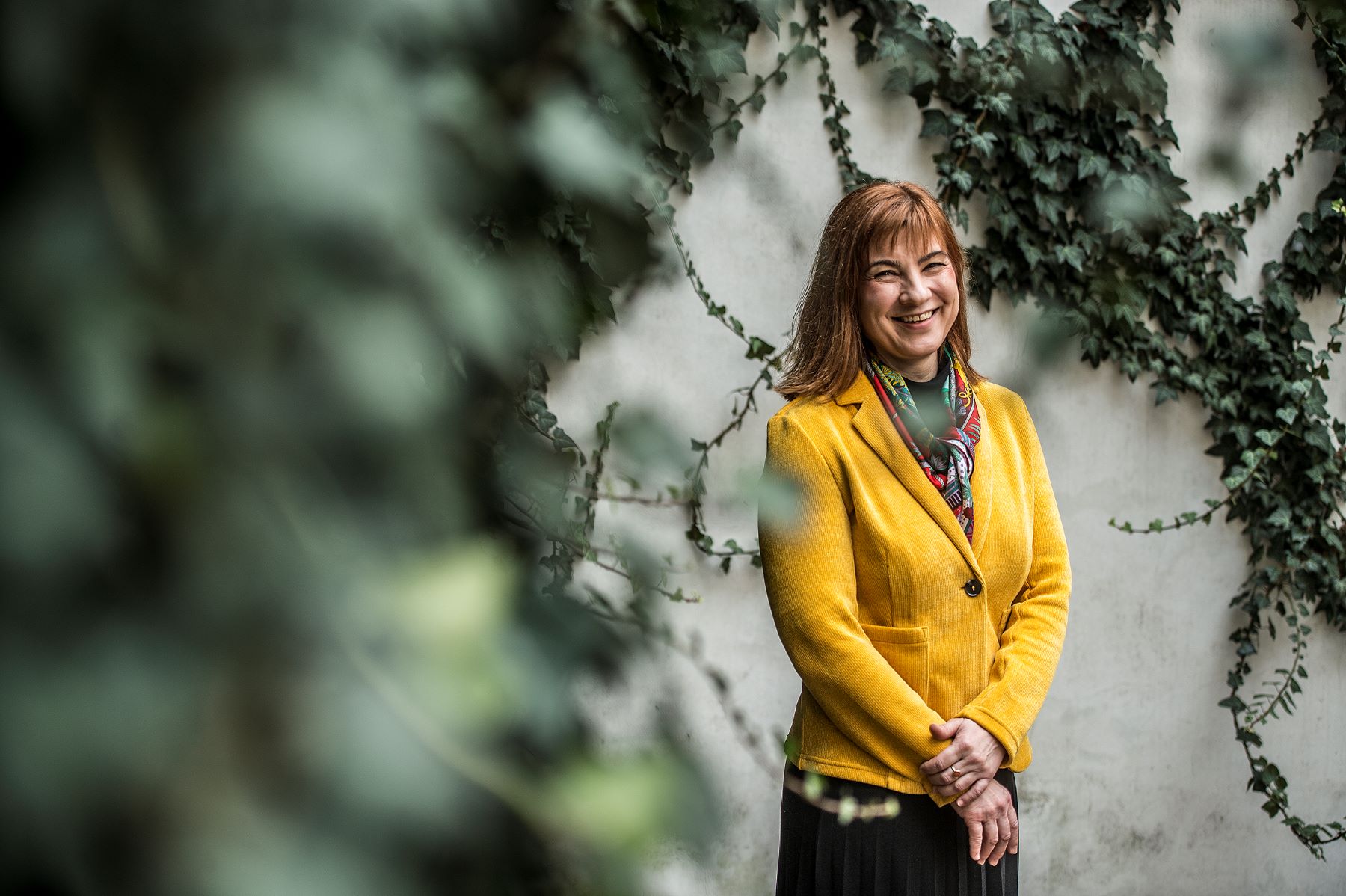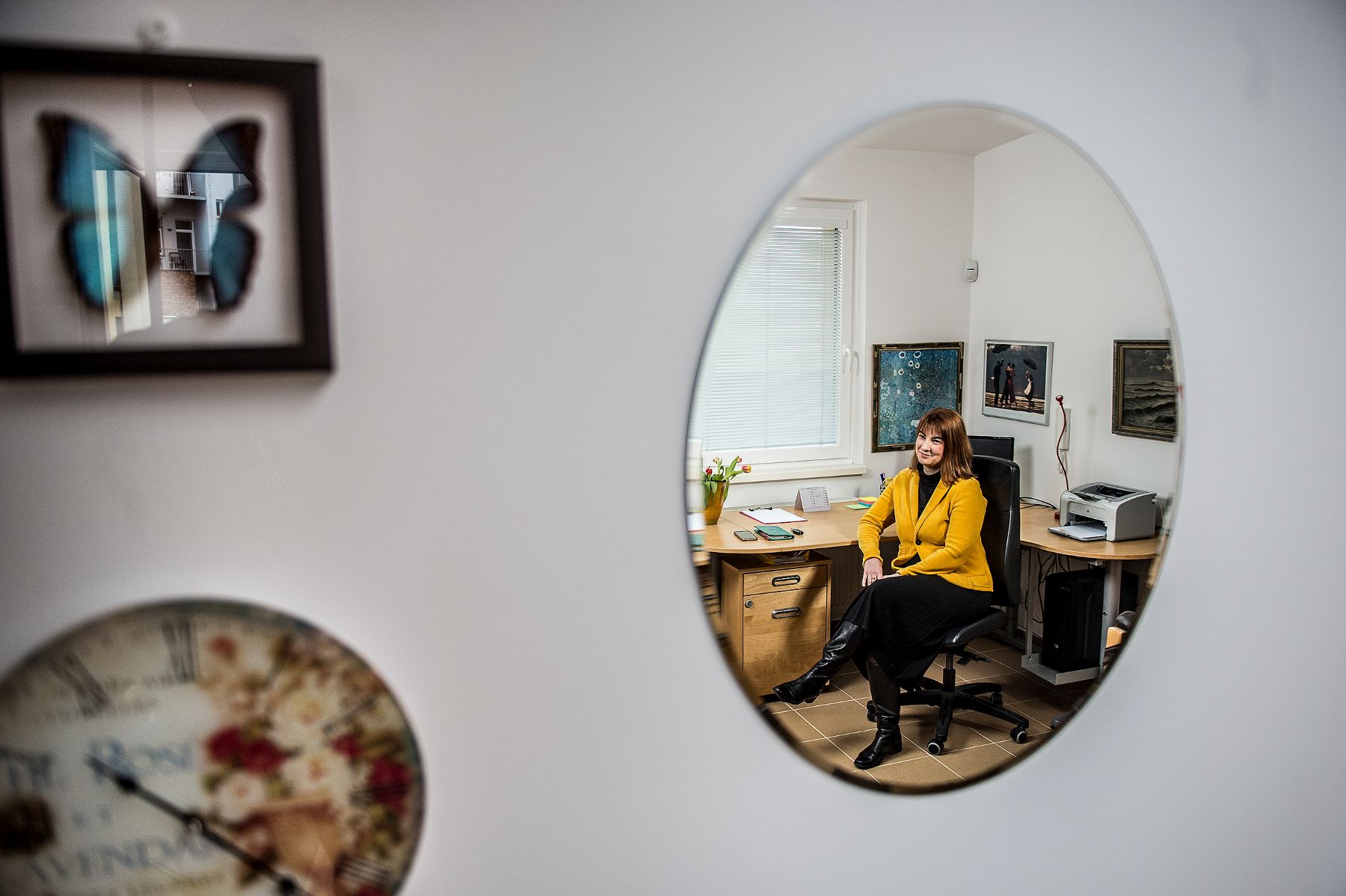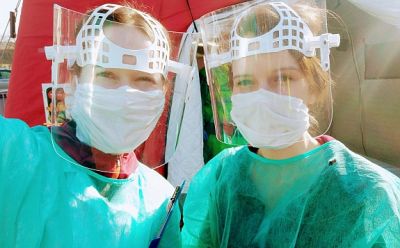Lucie Bankovská Motlová teaches at the Dept. of Psychiatry and Medical Psychology at the Third Faculty of Medicine at Charles University. She is outspoken about her field, how it can help patients live regular lives and debunks common myths. Above all, she talks about how important it is to eliminate prejudice and stigma when it comes to mental illness. Plus, she offers valuable advice on how to maintain good mental as well as physical health during the pandemic.
Together with colleagues, you recently published an article about med students’ level of interest in psychiatry: what was the motivation?
We got the idea while conducting separate research on med student attitudes or stigmas. The survey suggested that only around one percent of students were interested in becoming psychiatrists. Abroad, the number is higher, around 4 percent. That made an impression and compelled us to try to learn more.
The second impulse was the existence of a questionnaire by Czech-born US-based psychiatrist Richard Balon, who researched medical student views on psychiatry. It was available only in English, Spanish and a number of other languages before now and we thought it was a shame that it hadn’t been translated into Czech. We contacted him and requested his permission to translate the survey so we could introduce it here.
You sent the questionnaire to eight medical faculties in the Czech Republic – what did you learn?
The questionnaire was received by all students in years 1 through 6 and in 2019, representing more than 10,000 med students. We received replies from roughly 24 percent. The first question asked about their chosen field or all areas of medicine they were considering for their future. Almost 30 percent checked psychiatry and 15 percent child psychiatry, which was a welcome result.
But when we looked at the number of students who had already finalised their choice, we learned it was 1.6 percent of all med students and no one had checked child psychiatry at all. We also learned that students’ interest in psychiatry dropped after their freshman year. One quarter of students interested in psychiatry were warned off by people close to them, and almost 70 percent of med students thought that psychiatry is less prestigious than other medical fields. That sentiment, however, is the same around the world.
Mental health has been a big issue in recent years and there are reforms underway in the health care system. It seems that more psychiatrists will be needed, yet many in the field now are starting to retire and the next generation is not following in the earlier generation’s footsteps. That is alarming.
Why is there so little interest in paediatric psychiatry? Paediatry is otherwise very popular.
One reason is that child psychiatry is not taught properly. In total, some 100 hours are devoted to psychiatry and in that time students have to gain a full understanding of proper diagnosis – from mild depression to addiction to severe psychosis. Of that, two to four hours remain for child psychiatry. Some faculties have a bit more but it still isn’t enough. The answer is not to offer more hours – med students are already snowed under with the number of things they have to learn – but more electable courses specialising in child psychiatry, where students could gain more knowledge.
The other reason is that paediatric psychiatry is very complex, requiring you to not just work with the patient but with their family, their school and others. That scares students away. The characteristics of child psychiatry are also different: there is a lot of observation of how children play, how they interact with their parents. You have to have an excellent understanding of developing psychology, which also is not taught much at the medical faculties. As they grow up, you also have to stay on the same wavelength with the patient, to maintain their trust and that is something not all adults are good at.
How do you explain the drop in interest during med students’ studies?
In their first year, many students consider psychiatry to be something that is immensely interesting and many are attracted by the psychological aspects; the problem is when reality sets in and they visit locked psychiatric wards where patients – more serious cases – are treated. Even though the majority of psychiatric treatment takes place in emergency wards or day centres, med students are introduced to “major” psychiatry and that dissuades them. A number of them explained that they don’t know how to communicate with patients and that they are afraid. That shows that we have to pay more attention to teaching how to communicate with patients, and that we currently pay too little attention to students’ emotions. This is something that could be managed successfully with the right approach.
The lower interest in our field may also be the fact that other departments do more to attract students, they run campaigns and present their fields in a better light or even as miraculous in getting patients back on their feet. That’s something we don’t do and I guess it’s a mistake.
If I was a newly enrolled med student, how would you get me to sign on?
I’d try to show you psychiatry across the scale: from locked wards where patients receive acute care to the moment patients are ready to return to ordinary life. I would show you emergency care, which is where most patients are treated, and I would try to give you a sense of the complete experience. It’s important to emphasise that psychiatrists share the life-story of their patient and that is something other fields don’t have time for. The relationship with the patient is therapeutic. We can help with psychotherapy alone – to heal with words. It is wonderful to see how a person suffering from depression can come to life before your eyes.
The tempo is also different from other medical fields. You won’t be getting up in the middle of the night to go save lives. So it’s good for people who don’t want to work at the urgent pace of some medical professions. What is essential is to be patient and to like people.
How strong are stigmas or prejudices when it comes to psychiatry or mental illness? Are they disappearing?
Unfortunately they are not and this is true around the world. Patients, their loved ones and psychiatric care personnel, are all viewed negatively and here the situation is very poor: only eight percent of Czechs say they would be willing to work or be friends with someone with a mental problem. Compare that to 56 percent in England. Only three percent of Czechs would be willing to live with someone with a mental health issue, or seven percent to have a neighbour with such a problem. There are segments of the population that see things differently and the prejudices are less pronounced the younger people are. Med students receive special training where they meet people who share their experience with mental illness and this goes a long way in reducing stigmas. The same is true when people in the medical profession share their experience. It is very important to speak about mental illness because there are a lot of people who don’t know what bipolar disorder is, or schizophrenia or what the signs are and how the illness takes hold.
How do you counter prejudices?
Even a person suffering from mental illness may be unaware, thinking they are healthy. A study from 2017 suggested that about 20 percent of Czechs suffered from mental issues over the last year but only a fraction of them sought professional medical help. It is alarming that 10 percent of Czech adults have drinking problems but more than 90 percent do nothing about it.
Mental health and mental hygiene are being discussed, more and more, by well-known personalities as well as influencers and that can give people hope or inspire them to seek professional help. There are also organisations such as Nevypusť duši that speak openly about mental health and offer information.
When it comes to psychiatric care, what are some of the biggest myths?
Many people people think that psychiatric care does not have effective methods and don’t significantly help patients but that is not at all true. We have a wide range of healing methods at our disposal. Psychiatric treatment, the same as other medicinal fields, is based on scientific findings and results.
Another myth is that all patients suffering mental health problems are violent – we’ve all seen horror headlines in the media. It’s true that someone who is not adequately treated, who is delusional, may act violently because they feel threatened or try to defend themselves, but these kinds of mental states are treatable and a patient, receiving the right care, can lead an entirely normal life.
The pandemic has placed health care professionals under an enormous amount of stress; are you also teaching students how to cope?
All of the medical faculties offer psychological training course, teaching students not only how to communicate with their students but also how to take care of their own mental health. At the Third Faculty of Medicine, we pay a lot of attention to teaching mindfulness. It is being shown that mindfulness techniques are very effective, improving empathy, communication, lowering stress and offering positive effects on one’s life. It’s very useful, not just for med students.
As a technique, mindfulness teaches you to focus on the present – without judgement or expectations. Imagine the opposite and you get autopilot. You can train mindfulness through meditation, which is growing increasingly popular, and it is getting the attention of experts: it is proving to have even a physiological effect – lowering the stress hormone cortisol, improving the immune system, lowering cholesterol or certain tumour growth parameters.
|
A thereapeutic model of a sailing ship, used in psychotherapy |
What kind of an impact has this period had on mental health?
At first, there was a lot of anxiety from the unknown and it took away our regular lives and sense of safety. At the start, everyone followed the rules and the restrictions. As the pandemic has continued, people are tired and some have become undisciplined and no longer uphold safety measures. And it is really unfortunate because at the moment washing hands, wearing masks and maintaining social distancing, is still the best protection we have.
For health care personnel, the situation has been different: they were under enormous pressure right from day one. In the beginning, they lacked PPE, they saw people abroad dying in the first wave and things only got worse since the autumn. There are not enough people on staff, they work overtime, they work in teams were they don’t know each other well or aren’t fully in sync. And they see people, regardless of the treatment they receive, who are dying. For health care personnel it is an extremely trying time, both physically and mentally. Spending many hours at a time in maximum protective gear. It’s good that it is being talked about, but I don’t think enough is being done to help them.
Med students have also been volunteering from the start and are required by the government to help, at the same time they continue their studies…
It’s extremely taxing for them as well. Many of them help at hospitals while studying – because normal classes are underway [Editor’s note: online]. It’s problematic when in some places med students haven’t been vaccinated but face the same risks as regular personnel. At the same time, it is wonderful that they are so willing to help and have been so active against Covid. For them it is also very valuable in terms of experience.
In terms of exhaustion from the situation, what should we do?
Almost all of us are suffering from isolation that can have a very negative impact on mental health. We are social animals, who draw energy from groups. At the moment, we have to hang on a little longer, until we are vaccinated and there is hope that this period will end. The pandemic can teach us just how fragile mental health is; but we can take care of our mental health, too. Simple rules can be followed we all know: to eat properly, to get enough sleep, partake in physical activity, to spend time outside, to interact with others, safely, to continue one’s hobbies. And, I have to stress, to avoid alcohol. Alcohol weakens immunity and cognitive function and makes the situation even worse.
It’s very important not to ruminate, to get caught in negative thought cycles. If you are stuck in a bad mood, do something physical, replant plants, wash the dishes, do something with your hands. It’s also important not to compare your situation with others, which is one of the risks of social media. I would recommend carefully choosing your media diet – choose a reliable source and stick with it, don’t let yourself be swamped by the flood of information.
If someone needs professional help, what are the signs?
It’s normal for use to have a bad afternoon once in a while. But if you have been feeling hopelessness for a longer period, if you realise you have been sad for 14 days straight, if you cry easily and often or begin getting thoughts about taking your life, that’s the moment to immediately seek out help and not delay. To pick up the phone and call the centre for crisis intervention that operates 24 hours a day every day, where you can talk to someone who will listen.
How do you care for your own mental health?
Physical activity: I love dance, ballroom and Latin American, and when I can, I dance. I like skiing, which is off-limits now, and I exercise every day, especially for strengthening the core body – the back and stomach. I don’t drink. I meditate, at least for a few minutes if I don’t have time. And the other thing which is fantastic? We have a dog. Dogs are excellent company and force you to get out of the house and go for a walk. If you have a dog you are never alone.
| Professor Lucie Bankovská Motlová |
| Lucie Bankovská Motlová teaches psychiatry and medical psychology at the Third Faculty of Medicine at Charles University. She completed her studies at the First Faculty of Medicine and her doctorate in psychiatry at the Faculty of Medicine in Hradec Králové. In her work she focuses extensively on the destigmatisation of mental health and treatment and on educative programmes. She spent two years at the University of California, Berkeley in the US. |

























